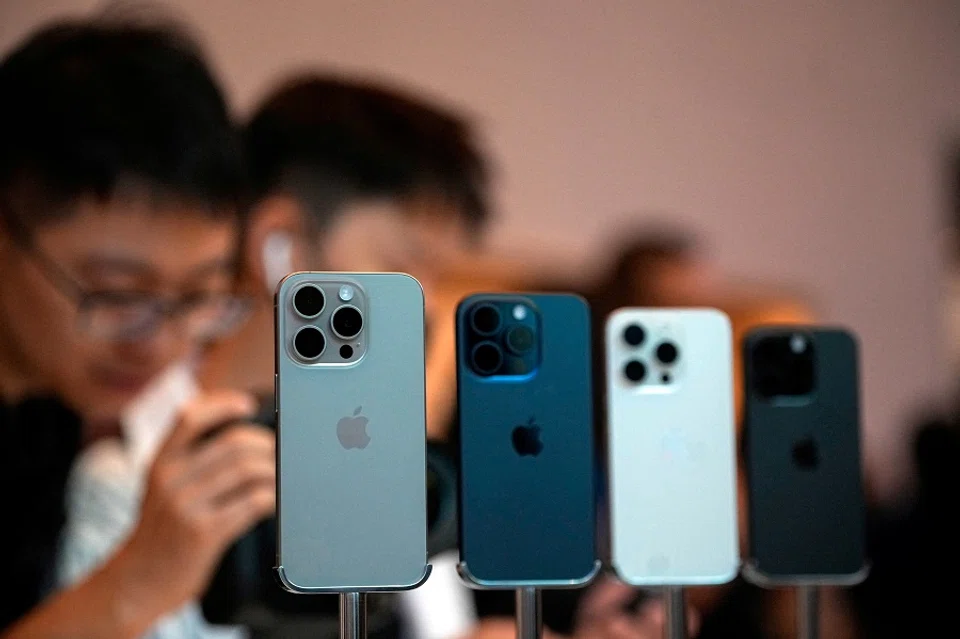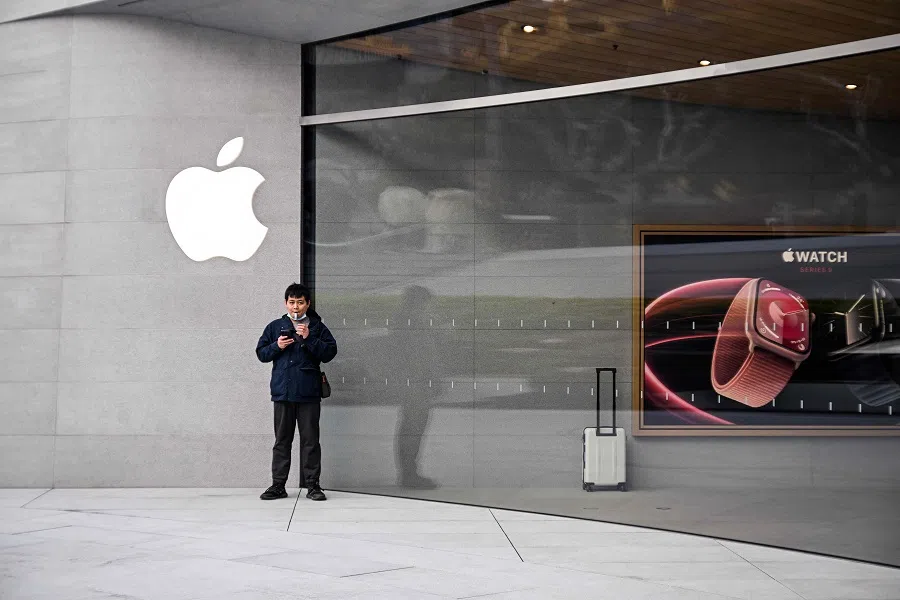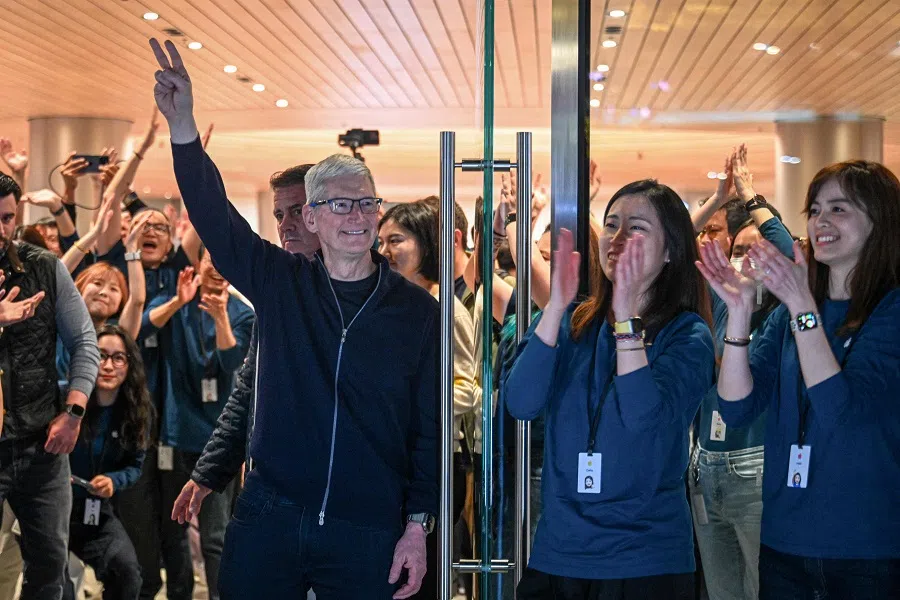Apple's bid to pull off a rebound in the Chinese market
Chinese consumer interest in Apple iPhones is waning as competitors eat away at its market share. Analysts also believe that the lack of innovation in the new releases has led to declining sales. Meanwhile, Chinese manufacturers remain an important part of the production of Apple products, with no viable replacement in sight. Lianhe Zaobao journalist Daryl Lim speaks with experts and academics to find out more about Apple's place in China.

"There's no supply chain in the world more critical to Apple than that of China."
Apple CEO, Tim Cook, underlined the importance of his company's cooperation with China during his interview with China Daily, China's official English newspaper, on 20 March in Shanghai.
Cook was effusive in complimenting Chinese manufacturing's modernisation efforts over the last three decades, and felt that the country's factories have achieved a very high degree of automation. He said, "They have robotics, automatic guided vehicles and very precise vision systems. It is the most advanced manufacturing in the world."
Other markets cannot replicate China's supply chain
Against a backdrop of global geopolitical tensions and increased risk of China-US decoupling, there have been news of Apple divesting from China and shifting parts of its supply chain to India and other Southeast Asian countries in the last few years.
According to reporting by Nikkei, a research agency dissembled Apple's latest iPhone 15 series and found that the percentage of components supplied by China shrank from 3.8% in the previous generation to 2.5%.
In November 2023, Ming-Chi Kuo, renowned for his accurate forecasts on Apple products, pointed out in a report that 12-14% of the iPhones produced in 2023 were made in India, and the number could grow to 20-25% in 2024 as the scale of Apple's manufacturing in China contracts further.
Despite this trend, Cook became a frequent visitor to China as he made three trips there within a year. On his most recent trip, he met with the leadership of key Chinese suppliers such as BYD, Lens Technology and Everwin Precision, and pledged to build up and invest more in China.
Cook described the importance of his company's "longtime, win-win" relationship with its Chinese suppliers, one that "really makes things happen" and "where one plus one equals three".

BYD provides original parts and assembly services for multiple Apple product lines; Lens Technology is Apple's glass supplier; and Everwin Precision provides key exterior parts for Apple product lines.
Cook described the importance of his company's "longtime, win-win" relationship with its Chinese suppliers, one that "really makes things happen" and "where one plus one equals three".
Some analysts feel that there is a bigger diversity of Apple suppliers in recent years so that the company no longer relies on just a few major ones. Instead, it is now looking for more partnerships with smaller suppliers to ensure its supply chain is more stable and flexible.
Lucas Zhong, a research analyst at market research firm Canalys, told Lianhe Zaobao that China is still uniquely placed to help Apple bring its new products to fruition. For instance, in the novel Vision Pro headset, or in upgrading the chassis of its iPhones from stainless steel to titanium alloy.
Zhong said, "It is very difficult for Apple to find another supply chain that can respond so quickly and at such high yields. Both the depth and breadth of Chinese suppliers give China an advantage that is tough for other markets to replicate."
At the same time, the Financial Times reported in 2023 that Apple faced frequent stumbling blocks with its manufacturing in India. A source revealed that Apple chassis produced by the Indian manufacturing giant, Tata Group, had a yield of 50%, a long way off Apple's target of zero defects. At the time of writing, Apple did not respond to Lianhe Zaobao's requests for comment.
Given unfavourable factors such as a slowdown in the Chinese economy, intensifying China-US rivalry and the rise of patriotic consumerism, it would not be easy for Apple to reverse the decline in iPhone sales in China.
Losing market share
Aside from meeting suppliers, Cook's high-profile appearance at the opening of a new Apple store in Shanghai also drew plenty of attention. Given that Cook rarely shows up at the opening of Apple stores outside the US, his appearance emphasises how important the Chinese market is to Apple.

Fu Fangjian, an associate professor at the Singapore Management University (SMU) Lee Kong Chian School of Business, told Lianhe Zaobao that Apple is clearly trying to placate Chinese consumers with its recent moves. He said, "China is especially important to Apple not just because of its manufacturing capabilities, but also for its consumption power."
At one point, news that Apple was switching to India for the mass production of its products drew the ire of some Chinese netizens, so when the company revealed its latest iPhone series last September, there were calls for a boycott on the internet.
Nevertheless, China remains one of Apple's largest overseas markets. Data from Canalys show that China accounts for 23% of the company's global shipments for 2023, making it the second largest market for Apple products. In 2023, Apple took 19% of the market share in China, coming out on top for the first time.
However, there are indicators that the brand's influence is under pressure in China. Figures from Counterpoint Research reveal that for the first six weeks of 2024, iPhone sales in China fell by 24% year-on-year, and Apple's market share decreased from 19% to 15.7%.
During the same period, its biggest competitor in China, Huawei, enjoyed a massive growth of 64% in sales. Huawei's market share also rose from 9.4% to 16.5% as it overtook Apple.
Given unfavourable factors such as a slowdown in the Chinese economy, intensifying China-US rivalry and the rise of patriotic consumerism, it would not be easy for Apple to reverse the decline in iPhone sales in China.
"Apple's competitors in China are Huawei, OPPO and Xiaomi. If it wishes to have a bigger slice of the Chinese market, it has no choice but to better understand them, pay closer attention to the novel solutions they are developing and learn from its findings." - Associate Professor Fu Fangjian, Lee Kong Chian School of Business, SMU
R&D expansion in Shanghai and Shenzhen
Several analysts have also highlighted a lack of innovation in the last few generations of iPhones as one of the main reasons for waning interest in Apple's high-end offerings among Chinese consumers.
A week prior to Cook's trip to China, Apple announced plans to expand its research facilities in Shanghai and Shenzhen to deepen its partnerships with local suppliers, and to enhance its product testing and research capabilities.
SMU's Fu feels that the new laboratories signal Apple's intention to overcome its innovation bottleneck and come up with breakthroughs in the most competitive and innovative smartphone market.
He said, "Apple's competitors in China are Huawei, OPPO and Xiaomi. If it wishes to have a bigger slice of the Chinese market, it has no choice but to better understand them, pay closer attention to the novel solutions they are developing and learn from its findings."

Shenzhen is one of the world's largest hubs for mobile phone manufacturing. Canalys's Zhong feels that Apple's intent for setting up a research centre with supply chain functions in Shenzhen is for more convenient interaction with its suppliers so that the introductory phase of new products can proceed more smoothly.
Meanwhile, Apple's research facility in Shanghai is more focused on software. Zhong shared that even though the iOS is a comprehensive software ecosystem, it lacks local features that Chinese users rely on which are available in phones from Chinese brands. For example, while the iPhone supports near field communication (NFC), the feature cannot be used for the public transit cards in certain Chinese cities.
He said, "The internet ecosystem in China is very different from abroad. These research centres can help Apple to better understand market needs before it goes on to develop some localised functions."
Zhong added that Apple also hopes to enhance its brand image in China with such a move, so that it is not just perceived as an American company, but also a socially responsible one that can contribute towards China's industrial transformation and provide jobs for the Chinese society.
This article was first published in Lianhe Zaobao as "苹果力求扭转在华销售跌势".





